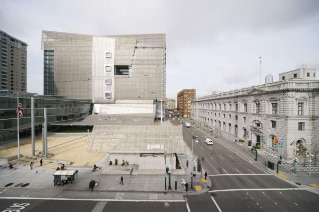Titled The Banal, his principle complaint is that the Biennale — architecture's most significant international exhibition — is now nothing more than an "industry meeting, like a product fair". Networking has taken priority over the development of theoretical arguments, producing an event that is "staid and fake… hollow, arduous, exhausting, bleak and boring". Lacking in content, empty, conservative, and populist, Prix compares the hubris of the Biennale's parties to the last song on the Titanic.
The problem, he tells us, is that "politicians and project managers, investors and bureaucrats have been deciding our built environment. Not the architects." With a final flourish Prix ends grandly: "Furthermore, I consider that the Venice Biennale of Architecture needs to be reorganised."
The letter, first printed by the Architect's Journal in London, attracted a great deal of attention — although it has failed to draw much response. This article is an attempt to address his complaints in a methodical manner; on behalf of the generation defined by a global recession we really had very little part in causing.
The Death of the Starchitect
Certain specific remarks made by Prix make it clear he hasn't seen this year's Biennale. I saw all the pavilions and exhibitions (and a good deal of the collateral events), and the general shift — especially in comparison to the 2008 or 2010 — was toward the left. In the last two years the world has experienced some phenomenal historical developments, most notably the Arab Spring and Occupy movement. Taken in conjunction with the gradual decline of the West, and the continued rise of Asia and South America, signs of struggle, activism, so-called architectures of conflict, were everywhere (also seen in their conspicuous absence: the Bahraini pavilion was an eerie photographic series showing streets without people).
It is no coincidence that both Golden Lions went to projects in which the architect's role was either backgrounded or absent. Urban-Think Tank (with Justin McGuirk and Iwan Baan) documented the impromptu communities of Venezuela's Torre David, a so-called "vertical slum". Toyo Ito, and the Japanese pavilion, presented a post-tsunami redevelopment project in which the villagers themselves — fishermen and schoolteachers — developed their own homes through a design studio. Both of these, in contrast to Prix's accusations, demonstrate that both political engagement and currency are at the heart of the Biennale's interests.
The starchitects were very obviously overlooked (even discretely derided).
Endemic Failure
If we are to accept a certain validity in Prix's remarks, it is important not to attribute special privilege to the Venice Biennale — it is only indicative of a more widespread political naivety in contemporary architecture, and the ineffectiveness of its various governing institutions. The failure, if you will, is endemic. However, unlike Prix, I don't think the starchitects are at the heart of the problem. I would prefer to lay the blame elsewhere.
I am acutely aware that the generation directly above me (born in the 60s and 70s) failed to fulfil the occidental Oedipal tradition of overthrowing those that came before them. They are, on the whole, incapable of seriously criticising the starchitects, and therefore complicit in the unquestioning adoption of neoliberal economic values. Independence, as opposed to nepotism, requires a kind of action-hero position: protagonists with nothing to lose, and therefore everything to gain.
This is not to say that the future of architecture is hopeless, or that the fire has completely died. It would be unfair to the (numerous) contemporary architects and theorists I admire to say that the profession has approached an apolitical singularity, from which there can be no return.
Millennium People
Prix, who is 45 years older than me, should well direct his criticism at the age-group I've mentioned: those most implicated in the era of mindless property bubbles and speculative developments. If there has been a decline in meaningful, current, operative theory then it has been paralleled by a decline in the social agency of the architect — an agency progressively forfeited by architects at least since Reagan and Thatcher.
Architects are indeed agents of an immoral socio-political and economic model. Architecture is (in a bad way), but the crisis is also perennial. This is partly what makes architecture such an interesting and exigent field. Therefore, it is unfitting to think that this moment is in some way historically privileged.
It is the responsibility of each generation to, in a sense, reinvent the discipline. The gaping hole has been slowly getting bigger for the last 30 years. The institutions of architecture are no longer capable of evolution — which would introduce an intolerable instability — and therefore no longer capable of remembering their purpose or reimagining their future. There is absence of criticism from those in positions of authority, and the little disagreement that exists appears in a largely superficial or insincere way.
However, a new generation is hot on their heels: one that will shortly eclipse both the Baby Boomer starchitects and their Gen X prodigies. I am referring to those variously called the New Millennials and the Digital Natives. Significantly, since the financial crisis, students of my age — children of the late 80s — have become both rapidly and radically politicised, and I believe this is cause for a cautious optimism.
The reorganisation of the Biennale, as Prix demands it, will be extremely difficult. The event is deeply entrenched within a particular twentieth century conception of architecture. More significantly, structural change would be incompatible with the financial systems employed to realise the "exhibition". The change Prix wants to see would be nothing short of paradigmatic.
The best way to reinvigorate the Biennale would be to reduce the mean age of exhibitors by about two decades, reducing also the cost of collateral events (the current entry price is €16,000) in order to encourage wider participation. The key is to create a situation unfettered by either expectation or history — in which we might return to the essence of the Biennale as a forum for the political expression of architecture.
Jack Self (@jack_self) is a London-based architect and writer. He edits the Architectural Association's free weekly publication, Fulcrum.






